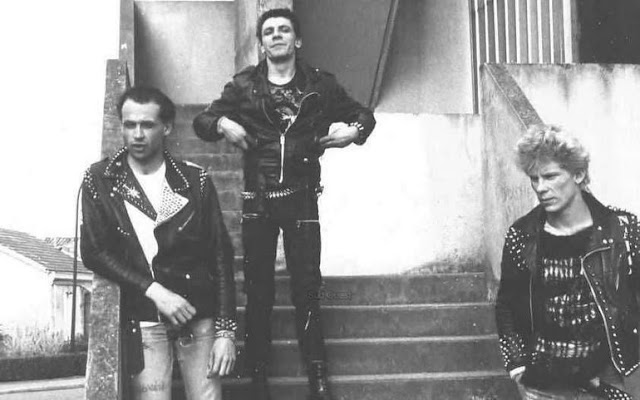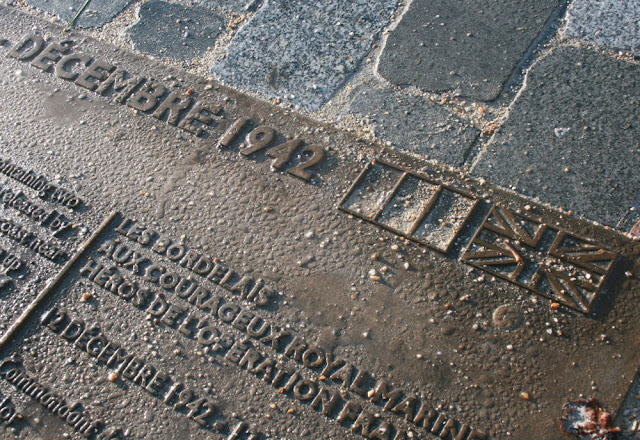During the recent Musical Écran festival organised by the Bordeaux Rock association (coincidentally also part of the most recent Invisible Bordeaux blog item), one of the music documentaries I got to see was the incredible “Punk – Il était une fois Gilles Bertin”. The hour-long film, directed by Eugénie Grandval, tells the remarkable story of how a key player on the 1980s Bordeaux punk rock scene was part of a high-profile heist, disappeared off the map completely for 30 years, then sought redemption and to rebuild his identity from scratch.
The story goes that Gilles Bertin was born in Paris in 1961 before spending his formative teenage years in Bordeaux. As soon as he was able to leave behind his home and his civil servant parents he did just that. He moved into a squat and, in 1981, became the vocalist and original bassist of the punk rock band Camera Silens. The group, who tended to hang out around Place Saint-Projet and the Saint-Pierre quarter, were soon big on the local scene, winning high-profile battles of the bands, and they rapidly developed a nationwide following.
 |
| Early 1980s Camera Silens publicity shot, Gilles Bertin to the right. |
The band’s relative success however was not providing enough income to fund Bertin’s heroin addiction, and so he fell into a life of petty crime and robberies, which adhered to the rules of thumb he and his cronies – mostly artists, fellow drug addicts, and anarchic activists – had set themselves, i.e. that this would generally involve stealing from The Man and that nobody would get hurt in the process.
By 1986, this darker, illicit existence outweighed Bertin’s musical career and he split from Camera Silens. Then, in 1988, he and his partners in crime were involved in their most notorious coup: a large-scale operation, reportedly two years in the making, involving home-made replica police uniforms and a fake police car, a finely-tuned scenario and mock interrogations. The heist enabled them to steal more than 11 million francs in banknotes (around 3 million euros in today’s money) from the Brink’s warehouse located in Toulouse.
Over the following two years, the various members of the gang were caught one after the other. But Bertin had managed to escape to Spain’s Costa Brava, leaving behind not only his homeland but also his partner and newly-born son Loris. While on the run (an international arrest warrant had been issued), as well as spending all his money he met one Cecilia, with whom he moved to Lisbon where they opened a tiny but influential indie record store which operated for ten years.
Camera Silens performing 'Réalité' for FR3 in 1985. Click here if video does not display properly.
Needless to say, officially Bertin no longer existed and the fugitive went by various names including Didier Ballet. The plot thickened though when in 1995 Bertin fell ill, and it emerged that his years of heroin addiction had finally caught up with him: he was HIV positive and had contracted AIDS. Despite being at death’s door, he was saved first by a hospital in a Communist-run town where no questions were asked about his identity, then by the advances of research and the administration of triple combination therapy.
In the early 2000s, Bertin and his partner relocated to Barcelona, running the bar owned by Cecilia’s parents. The couple had a child together, Tiago, whose birth in 2011 led to Bertin deciding the time had come to open up about his past and move forward with a clean conscience. In November 2016, he chose to return to France to hand himself in to the authorities.
As detailed in the documentary, by then Bertin was no longer really considered a public enemy, and if anything his reappearance was not especially welcome as it revived a cold case (and therefore multiple layers of paperwork and admin) that was no longer considered relevant by any of the parties involved. But Bertin was nevertheless put on trial and, thirty years on from the heist, was sentenced to a five-year suspended sentence, therefore escaping a stay in jail.
By becoming a free man able to live life in the open once again, from then on Bertin was able to connect with his first son Loris (whose mother had died in the intervening years), took the time out to collaborate with Libération journalist Jean-Emmanuel Escarnot on drafting his memoirs (Trente ans de cavale : Ma vie de punk, published by Robert Laffont in February 2019 – Escarnot passed away before its release), and divided his time between Toulouse and Barcelona, where he continued working in the bar alongside Cecilia, and raising Tiago.
 |
| Bertin during a meet and greet event to promote his book in 2019. |
But, given that the authorities had declared him deceased in 1992, another of Bertin’s priorities was to obtain his French identity documents. This became a long and drawn-out battle which eventually lasted three years, with some of the Catch 22 situations being caught on camera in the documentary. He was finally given his new ID card on August 2 2019 but, just days later, his health ailing once again, Bertin fell into a coma. He died on November 7 2019 in Barcelona, aged 58.
The Musical Écran screening of the documentary, the first time it had been shown as part of a film festival in France, was an emotionally charged event. Many friends and contemporaries of Gilles Bertin were in the audience, and Eugénie Grandval was herself present to explain how the documentary had initially set out to be the uplifting story of the reformed Bertin regaining his identity, but instead finished up as a sad tale tracking the administrative nightmare of his final years.
Bertin’s partner Cecilia was also present (she had symbolically brought along his trusty briefcase), and highlighted how much that final administrative ordeal had taken out of Bertin. His first son Loris, who is still based in Bordeaux and is now a prominent player on the local techno music scene, also spoke about how his relationship with his father had gradually developed over his final years. Finally, Bertin’s solicitor was on hand to shed further light on the rebirth of the former punk rocker.
As somebody who was very vaguely familiar with the Gilles Bertin story, having skim read press articles that came out when he reemerged into the public domain and once again when he passed away, it was an absolute privilege to be given this more extensive glimpse into the life and times of the reformed punk/bank robber.
And, what can I say, the Eugénie Grandval documentary – the production of which was initially triggered by an article the director had read in Libération – is compelling and essential viewing. It has already been broadcast on terrestrial TV in France, has been screened at other festivals around the world, and does happen to be available on Youtube in its entirety. I’m not sure how legal the upload is but do yourself a favour, set aside 58 minutes of your time, and take in this incredible story. “Once upon a time, there was Gilles Bertin...”
Click here if video does not display properly.












0 commentaires: